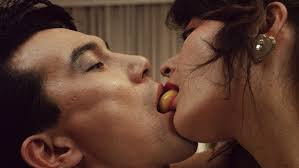From Ratatouille to The Hundred Foot Journey and Chef, recent cinema has given us plenty of films in which characters are motivated by the pursuit of culinary excellence. None, however, rivals Jûzô Itami’s 1985 “noodle western” Tampopo, now available in a new 4K restoration with superior English subtitles. Noboko Miyamata
Western food tends to a deracinated norm. Pizza, curry, sushi and tacos transcend frontiers. Britain’s most popular dish is Chicken Tikka Marsala. When France’s first McDonald’s franchisee dared to tinker with the beef patty recipe and the dimensions of his frites,the home office in Chicago shut him down. Whether in Ankara or Alice Springs, a Big Mac must remain a Big Mac.
Anyone, however, who has eaten in Japan knows that such rules apply less there. Pizza and hamburgers are still available, but the range of regional delicacies and the variety among even such quotidian materials as pickles and pasta is matched by an attention to freshness and quality in fruits, meats and seafood that can verge on the fanatical. Where else are apples and pears chosen predominantly for appearance and displayed in individual styrofoam jackets to guard against bruising?
The same discrimination applies to the simplest of dishes, in particular the soft rice noodles in a meat-based broth, garnished with pork, shrimp and vegetables, known as ramen.
The contents of their trailer/tanker – milk – may put Goro and Gun (Tsutomo Yamazaki and Ken Watanabe) relatively low in the hierarchy of long-distance truckers but they share the professional interest in good roadside food. Their hopes for a new ramen place run by the widowed Tampopo – “dandelion” in Japanese – (Noboko Miyamata) are dashed, however. The barflies who clutter her establishment merely exacerbate its more basic problems; the tepid water in which she cooks the noodles, the lack of imagination evident in her broth, and a lacklustre range of garnishes.
Gun is ready to push off in search of a better meal but Goro, older, and exhibiting a courtesy and sympathy for the weak and afflicted worthy of John Wayne, bows to her wishes that he stay and undertake her education in the art of ramen. He also, no less in the spirit of the Duke and Howard Hawks, defies the barflies in a one-sided brawl that wins the widow’s heart.
After that, the resemblances, perceived by some reviewers, to Rio Bravo and Shane are less evident. It’s closer to those episodic films à sketches – Les Sept Peches Capitaux, Boccaccio ’70, L’Amour à Vingt Ans - that were an art-house staple of the sixties.
As Goro guides Tampopo through the intricacies of preparing and serving ramen, Itami cuts away to vignettes illustrating Japan’s complex relationship with food. An aged guru (Yoshi Kato) demonstrates to Gun his almost Zen manner of consuming ramen; how one should delay eating until one has appreciated the sheen of the soup, and offered a silent prayer of thanks to the ingredients for their sacrifice.
Elsewhere, an instructrice in foreign manners explains to debutants how to eat spaghetti Western style - neatly and in silence - until a nearby eater wolfing his noodles in the traditional manner sets off the students in a frenzy of slurping.
Kôji Yakusho, Fukumi Karoda...and raw egg
A group of vignettes features Kôji Yakusho as a suave white-suited yakuza and Fukumi Karoda as his adoring lover. Together, they indulge in some gloriously perverse sexual games, including placing scrabbling live shrimp under a glass bowl on her bare abdomen, and slipping a raw egg yolk from his mouth to hers and back again until it bursts orgasmically and drools from her lips.
The most sexually charged of these scenes takes place at a seaside village where Yakusho encounters some young girl divers. From one of them (Yoriko Doguchi) he buys an oyster. When, as he tries to eat it, the shell cuts his lip, she detaches the meat and invites him to eat it from her palm. Just before he does so, a drop of blood falls onto the glistening, vaginal flesh. The girl blushes and lowers her eyes, aware of a sexual dimension she is still too innocent to name.
Yakusho is also given the film’s final scene. Dying violently after a shoot-out, he fantasises to Karoda about eating sausages made from the intestines of wild boar that have gorged on sweet potatoes. “We will eat them together,” she murmurs as he expires.
Itami’s few films as director share a vision of modern Japan as a nation where samurai concepts of bushido coexist uneasily with the supermarket and shinkansen. It was a conflict of which he became a victim. After Tampopo, he was attacked and his face slashed by yakuza arguably angered by Yakusho’s character in the film. In 1997, his body was found on the street in front of his Tokyo office. It’s alleged that yakuza forced him to write a spurious suicide note, then threw him off the roof.
A good subtitled copy of Tampopo in two parts is also streamed HERE




No comments:
Post a Comment
Note: only a member of this blog may post a comment.